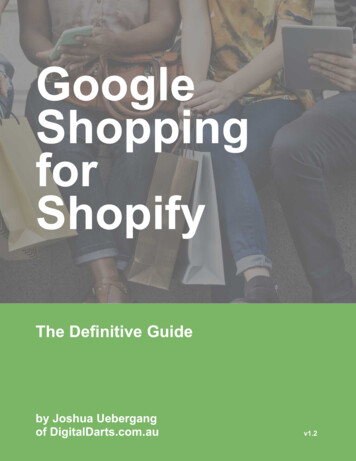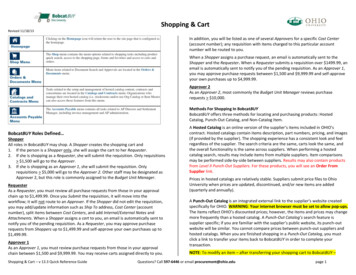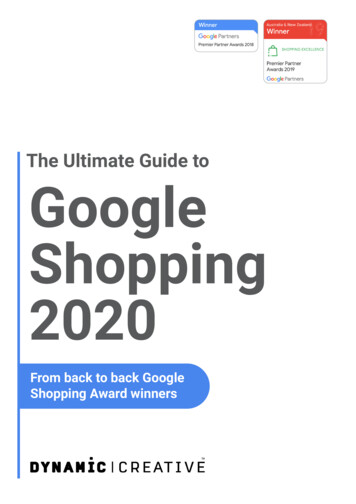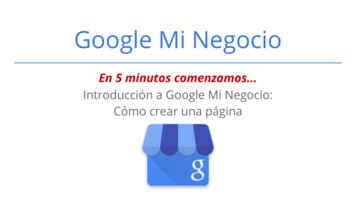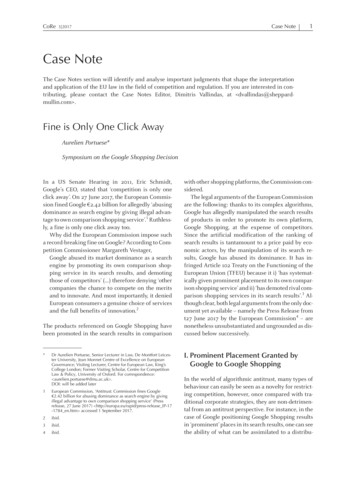
Transcription
CoRe3 2017Case Note1Case NoteThe Case Notes section will identify and analyse important judgments that shape the interpretationand application of the EU law in the field of competition and regulation. If you are interested in contributing, please contact the Case Notes Editor, Dimitris Vallindas, at dvallindas@sheppardmullin.com .Fine is Only One Click AwayAurelien Portuese*Symposium on the Google Shopping DecisionIn a US Senate Hearing in 2011, Eric Schmidt,Google’s CEO, stated that ‘competition is only oneclick away’. On 27 June 2017, the European Commission fined Google 2.42 billion for allegedly ‘abusingdominance as search engine by giving illegal advantage to own comparison shopping service’.1 Ruthlessly, a fine is only one click away too.Why did the European Commission impose sucha record-breaking fine on Google? According to Competition Commissioner Margareth Vestager,Google abused its market dominance as a searchengine by promoting its own comparison shopping service in its search results, and demotingthose of competitors’ ( ) therefore denying ‘othercompanies the chance to compete on the meritsand to innovate. And most importantly, it deniedEuropean consumers a genuine choice of servicesand the full benefits of innovation.2The products referenced on Google Shopping havebeen promoted in the search results in comparison*Dr Aurelien Portuese, Senior Lecturer in Law, De Montfort Leicester University, Jean Monnet Centre of Excellence on EuropeanGovernance; Visiting Lecturer, Centre for European Law, King’sCollege London; Former Visiting Scholar, Centre for CompetitionLaw & Policy, University of Oxford. For correspondence: aurelien.portuese@dmu.ac.uk .DOI: will be added later1European Commission, ‘Antitrust: Commission fines Google 2.42 billion for abusing dominance as search engine by givingillegal advantage to own comparison shopping service’ (Pressrelease, 27 June 2017) http://europa.eu/rapid/press-release IP-17-1784 en.htm accessed 1 September 2017.2ibid.3ibid.4ibid.with other shopping platforms, the Commission considered.The legal arguments of the European Commissionare the following: thanks to its complex algorithms,Google has allegedly manipulated the search resultsof products in order to promote its own platform,Google Shopping, at the expense of competitors.Since the artificial modification of the ranking ofsearch results is tantamount to a price paid by economic actors, by the manipulation of its search results, Google has abused its dominance. It has infringed Article 102 Treaty on the Functioning of theEuropean Union (TFEU) because it i) ‘has systematically given prominent placement to its own comparison shopping service’ and ii) ‘has demoted rival comparison shopping services in its search results’.3 Although clear, both legal arguments from the only document yet available – namely the Press Release fromt27 June 2017 by the European Commission4 – arenonetheless unsubstantiated and ungrounded as discussed below successively.I. Prominent Placement Granted byGoogle to Google ShoppingIn the world of algorithmic antitrust, many types ofbehaviour can easily be seen as a novelty for restricting competition, however, once compared with traditional corporate strategies, they are non-detrimental from an antitrust perspective. For instance, in thecase of Google positioning Google Shopping resultsin ‘prominent’ places in its search results, one can seethe ability of what can be assimilated to a distribu-
2Case Notetor (Google distributing third-parties information viasearch results) willing to promote its marginal endproducts (Google Shopping selling services). This corporate strategy involving sister companies of a parent company is very similar to, for example, the oneportrayed by a distributor (say, Tesco) putting ‘prominent placement’ of its own end-products (say, Tescofood products) on end aisle displays. To what extentdoes the ‘prominent placement’ given by Google Incto Google Shopping services differ from the one given by Tesco Inc to Tesco food products on end aisledisplays? To no extent.It is traditional corporate strategy of a parent company to favour its own products that have, througha trial-and-error evolutionary process,5 emerged as areward for the economic efficiency of the originaldistributing services. Fining by-products and the‘prominent placement’ parent companies can grantto these by-products leads to the prohibition of endaisle displays for products manufactured by the parent distributing company.The fundamental flaws in the European Commission’s decision are threefold.6Firstly, the European Commission over-exaggerates the entry barriers in the market of shopping services: ‘competition is only one click away,’ as Eric Schmidt rightly put it. There is no real evidence that customers are deterred from clicking to rival servicesdisplayed on the first page of the search results too.Indeed,the EU’s actions have created a cloud of uncertainty that will make large tech companies overly cautious about making changes to the user experienceand service offerings that would benefit consumers,as Robert Atkinson, President of the InformationTechnology and Innovation Foundation, a Washington-based think tank, has rightly warned in a statement following the Google Shopping decision.7Secondly, the European Commission overlooksthe absence of any dominance of Google Shoppingon shopping online markets: digital applicationsplatforms and other selling websites such as Amazonand eBay have much a more established reputationon selling services markets. In comparison, GoogleShopping is the result of a long and expensive trialand-error process which ambitions to take some ofthe market shares of powerful competitors.8 How cancompetition authorities refuse the ability of success-CoRe3 2017ful parent companies to encourage a weak daughtercompany to develop? If there is at all a regulatory issue, it should be a transfer-pricing one, not an antitrust one.Thirdly, and most importantly, the policy chosenby Google to promote Google Shopping services atthe top of its search results may very well end up being a bad strategy for consumers as they could prefer a different ordering of search results – namelywithout shopping results being promoted. Therefore, alternative search engines may, from a competitive viewpoint, emerge as credible substitutes for ashopping-free search engine. Fining Google now istantamount to rejecting the play of the competitiveprocess by which customers are ‘free’ to choose shopping services platforms such as Google Shopping andits rivals. Even more importantly, fining Google nowis a regulatory intrusion into the competitive processthat would lead to portray the promotion of GoogleShopping services as a competitive argument for therise of alternative search engines. Regulating and fining the downstream market (ie the online shoppingservices market) ultimately reinforces the status quoagainst the competitive process on the upstreammarket (ie the search engine market) by recourse toa quasi-essential facilities doctrine as discussed below.II. Rival Shopping Services Demotion inSearch ResultsAccording to the Commission, Google has also beenfined becauserival comparison shopping services appear inGoogle's search results on the basis of Google'sgeneric search algorithms. Google has included a5Geoffrey Manne and Joshua Wright, ‘Google and the Limits ofAntitrust: The Case Against the Case Against Google’ (2016) 34Harvard Journal of Law & Public Policy 171-244.6One early and convincing warning on a potentially detrimentalEuropean Commission’s fine against Google has been developedby Andrea Renda, ‘Searching for harm or harming search? A lookat the European Commission’s antitrust investigations againstGoogle’ (CEPS Report no 118, September 2015).7See Robert Atkinson cited by Amar Toor, ‘What the EU antitrustruling could mean for Google search’ (The Verge, 27 June 2017) -eu-antitrust-fine-search-impact accessed 1 September 2017.8For the emergence of Google as the leading search engine, seeRenda (n 6) 4-8.
CoRe3 2017number of criteria in these algorithms, as a resultof which rival comparison shopping services aredemoted ( ) Google's own comparison shoppingservice is not subject to Google's generic search algorithms, including such demotions.9Following these alleged abuses, the European Commission considered that the harm was evidenced bythe ‘sudden drops’ of the use of competitors’ shopping services, together with an increase in GoogleShopping services traffic.The bone of contention lays not so much on thenon-contestable and compelling evidence gatheredby the European Commission concerning the importance of appearing in first-page results, but on the actions imposed onto Google in order to comply withthe administrative requirements. According to theEuropean Commission, Google mustcomply with the simple principle of giving equaltreatment to rival comparison shopping servicesand its own service: Google has to apply the sameprocesses and methods to position and display rival comparison shopping services in Google'ssearch results pages as it gives to its own comparison shopping service.10Disappointingly, this will never truly happen. Indeed,should Google Shopping services be removed fromprominent placement in the search results, theGoogle Shopping ‘toolbar’ will always remain at thetop of the first page of search results. Forever will aparent company propose, in an advantageous position, its own end-products compared to those pro-9Commission, ‘Antitrust: Commission fines Google 2.42 billion’(n 1).10 ibid.11 Frank Easterbrook, ‘The Limits of Antitrust’ (1984) 63 Texas LawReview 1; Gary Becker and Steven Salop, ‘Decision Theory andAntitrust Rules’ (1999) 67 Antitrust Law Journal 41; David Evansand Jorge Padilla, ‘Designing Antitrust Rules for Assessing Unilateral Practices: A Neo-Chicago Approach’ (2005) 72 University ofChicago Law Review 73; Geoffrey Manne and Joshua Wright,‘Innovation and the Limits of Antitrust’ (2010) 6 Journal of Competition Law & Economics 153, 157, where the authors state that‘the error-cost framework lies at the heart of modern economicand legal debates surrounding the appropriate scope of monopolization law and other areas of antitrust’; Manne and Wright,‘Google and the Limits of Antitrust’ (n 5) 171-244.12 Indeed, the error-cost framework’s insight ‘becomes more important as our collective economic wisdom about a new businesspractice decreases – when a challenged practice or setting isinnovative’, in Manne and Wright, ‘Google and the Limits ofAntitrust’ (n 5) 180.Case Note3posed by downstream competitors (NOT CLEAR).Should competition authorities be concerned aboutGoogle’s condemned practices? The answer shouldbe negative for two main reasons: i) an efficiencyanalysis of the decision’s consequences reveals itsdetrimental impact; and ii) the reasoning of the decision portrays a conceptual pitfall by having recourse to the quasi-essential facilities doctrine.1. Efficiency Cost on Balanced AntitrustAnalysisThe harm caused to competitors is outweighed bythe benefits gained by customers, therefore the antitrust analysis can conclude the presence of efficiency net benefits for society. From an error cost perspective, which encapsulates the cost of error in curbing firms’ practices in expect of limiting anti-competitive behaviours, the cost of errors are clearly greaterthan the benefits derived from the future behaviourof Google in line with the Commission’s requirements.Indeed, error costs encompass both the cost of imposing a competitively detrimental fine of 2.42 billion but most importantly and less perceptibly, thecost of deterring innovation on the downstream market (online shopping services) and hindering competition on the upstream market (search engine market). The so-called ‘error-cost framework’11 helps understanding that the social cost of Type I errors (falsepositive) is always greater than the social cost of TypeII errors (false negative): Type I errors (i.e. erring bycommitting flawed antitrust interventions) are morecostly than Type II errors (ie erring by omitting appropriate antitrust interventions) because marketforces compensate for the latter error type (but notthe former). Type I errors are indeed more severelyenshrined in a legal order by the court or regulator’serroneous decision. Damages are therefore greaterwith the false positives of Type I errors rather thanwith the false negatives of Type II errors. This is eventruer in an innovative context such as the one encountered in the Google decision.12In the case of Google, the costs of innovation deterrence are important because the success ofGoogle’s search engine cannot be used to develop other products which are complement to the search functions (eg products such as Google Maps, GoogleBooks, Google Scholar, and of course, Google Shop-
4Case Noteping). The market of online shopping services is dominated by big players, and Google Shopping has suffered multiple failures in the past, as pointed out bythe Commission itself13. The success of Google’ssearch engine cannot, in the reasoning of the Commission, be used to develop other products in orderto enter other markets where Google is not present.Such deterrence to innovation can only generate immensely incommensurable and invisible costs.Google has succeeded in the new digital economy because it pioneered the design of complex and innovative algorithms.14 The competitive advantage obtained by Google, through a fair and transparent competitive process,15 in designing complex algorithmsenables Google to enter (and even create!) other markets which improve customer experience on Google’ssearch engine. Indeed, by deploying other activitiesthan the sole search engine, Google is progressivelyand innovatively becoming a general platform, increasing consumers’ satisfaction. Consequently, thefine imposed on Google clearly diminishes suchprospects without providing competitors substantialbenefits.Indeed, because of Google products’ interrelatedness, and because of Google’s proprietary rights toorganise its different products in a coherent mannerfrom the client’s perspective, Google retains the rightto put Google Shopping in the ‘toolbar’ at the top ofthe search results webpage. Therefore, even afterGoogle complies with the Commission’s decision, the‘prominent placement’ of Google Shopping in searchresults shall remain unaffected. Should the Commission force Google to remove the Google Shopping‘toolbar’ in order to remove all possible ‘prominentplacement’, the violation of Google’s proprietaryrights would be manifest. If this potentially wrongrequirement imposed onto Google is a manifest violation of its proprietary rights, then the current requirement imposed by the debated decision can besaid to be a simple but real violation of its proprietary rights to organise its products in a free and legitimate way.On the one hand, the costs on innovation are important because of their deterring effect on enteringand creating new markets by Google. On the otherhand, the benefits of the present decision in termsof antitrust consequences are very limited for rivals.Competitors will indeed continue to ‘suffer’ fromGoogle’s competitive advantage of Google Shoppingappearing on the ‘toolbar’. Competitors will also con-CoRe3 2017tinue to enjoy large presence on digital applications(which is the fastest growing sector with the rise of‘M-Commerce’16) and websites. Therefore, the decision will have little beneficial consequences for competitors if such benefits were the goals of the Commission’s decision. The benefits clearly do not outweigh the efficiency loss in terms of dynamic efficiency (innovative stimulus). However, major costs(error costs and innovative costs) shall be borne byGoogle – for deterring innovation and complementarity of different markets present on a general platform – and Google’s consumers – for both impedingthe consumer’s choices of complementarities and forreinforcing the position of Google’s search engine.The very limited benefits granted to Google Shopping’s competitors in light of the prohibitive socialcosts on innovation and consumers’ preferences leadto the conclusion that the overall net economic impact of the present decision is negative. This is truefrom transactional and dynamic efficiencies perspectives as discussed so far. It is even truer from an evolutionary perspective when the competitive processas such is considered. It is this evolutionary perspective we will next examine.2. The Competitive Process Hindered bythe EU Essential Facilities DoctrineApplied to GoogleThe Commission’s reasoning is tantamount of treating Google’s search engine as a quasi-essential facil-13 Commission, ‘Antitrust: Commission fines Google 2.42 billion’(n 1), where the Commission says that ‘when Google enteredcomparison shopping markets with Froogle, there were already anumber of established players. Contemporary evidence fromGoogle shows that the company was aware that Froogle's marketperformance was relatively poor (one internal document from2006 stated "Froogle simply doesn't work")’. Apparently, themultiple failures of Google Shopping in the past did not convincethe Commission that Google Shopping is not currently dominating its market but precisely is acting pro-competitively as anoutsider against established incumbents.14 See Renda (n 6) 4-8.15 Google’s current super-dominance is the result of the businessstrategies and innovations which trumped Yahoo as the mainsearch engine. See ‘A Tale of Two Brands: Yahoo’s Mistakes vs.Google’s Mastery’ (Knowledge@Wharton, University of Pennsylvania, 2016) of-two-brands-yahoos-mistakes-vs-googles-mastery/ accessed 1September 2017.16 Andrew Meola, ‘The Rise of M-Commerce: Mobile Shopping Stats& Trends’ (Business Insider, 21 December 2016) hopping-trends-stats-2016-10/ accessed 1 September 2017.
CoRe3 2017Case Note5ity,17 reinforcing its dominant position on the searchengine market while weakening its outsider positionon the shopping services market.18 A facility is ‘essential’ whenever a facility is, cumulatively,‘unique’19 and ‘absolutely necessary’20 to anyonewishing to enter the relevant market. Antitrust analysis challenges the Commission’s position when thedifferent relevant markets are considered. Google’ssearch engine is neither unique nor absolutely necessary (alternative search engines exist) to onlineshopping services (alternative selling services existsuch as mobile applications and websites). Furthermore, having not refused to reference rival shoppingservices (hence no refusal to deal can be evidenced),Google has only increased the costs of rival shoppingservices via algorithm-driven strategies.Forcing Google to give access to rival shopping services onto its search engine results reminds us of theCommission’s Microsoft21 decision where it forcedWindows (the PC operating system) to give access toessential code and interface information for rivals’software products. Windows was treated as an essential facility for software competitors and Microsoftwas said to be blocking access to these end-products,it was fined by the European Commission is a simi-lar fashion to the present Google Shopping decision.22Considering Google’s search engine as an essential facility is both economically wrong23 and competitively flawed. Forcing Google’s search engine togive non-discriminatory access to Google Shopping’scompetitors would be a ‘red herring from an antitrustperspective’24 since the search results placement is aprice. Also, it would reinforce the status quo regarding the dominance of Google’s search engine. Indeed,the Commission is de facto giving Google’s searchengine the status of the essential platform by whichmost online sales must be fairly referenced.25 A moredynamic and evolutionary perspective would haveconsidered that customers, by finding search resultsbeing algorithmically biased towards Google products at the expense of other interesting competitors’products, would have either swapped to alternativesearch engine free of algorithmic manipulations orswapped directly to digital applications offeringshopping services (eg Amazon app; Ebay app, etc).The Commission’s decision, on the contrary, detrimentally takes Google’s search engine dominance asa given, treats it through the lens of a quasi-essentialfacility, and thus reinforces the dominance of Google17 See Joined Cases C-241 and 242/91 P Radio Telefis Eireann vCommission [1995] ECR I-743 for adopting implicitly in the EUthe essential facilities doctrine. See also, Joined Cases T-69/89 andT-76/89 RTE & ITP v Commission [1991] ECR II-485 and 575; Case53/87 Maxicar v Renault [1988] ECR 6039; Case 238/87 Volvo vVeng [1988] ECR 6211; Case C-7/97 Oscar Bronner GmbH & CoKG v Mediaprint Zeinungs-und Zeitschriftenverlag Gmbh & Co KG[1998] ECR I-779. For an overview of EU essential facilities doctrine and restraints on contracts, see Damien Neven and PetrosMavroidis, ‘The Interface Between Competition and Contract Law.The Case of Essential Facilities’ (EUI 2003 EU Competition Lawand Policy Workshop/Proceedings) 200306COMP-Neven-Mavroidis- sII.pdfaccessed 1 September 2017.23 As of April 2017, it is estimated that Google represents ‘only’79.4% of market shares of the search engine market. See, ‘Desktop Search Engine Market Share’ (Netmarketshare, no market-share.aspx?qprid 4&qpcustomd 0&qpcd 1300 accessed 1 September2017. Despite being considerably large, the market shares ofGoogle are both well below 100% (perfect monopoly) anddeclining. Indeed, competitors are progressively gaining greatmarket shares on the search engine market. See, ‘Google’s SearchMarket Share Down in Year-Over-Year Numbers’ (Search EngineJournal, 22 August 2015) / accessed 1 September 2017.18 The Commission considers a facility to be deemed ‘essential’ ‘ifwithout access there is, in practice, an insuperable barrier to entryfor competitors of the dominant company, or if without accesscompetitors would be subject to a serious, permanent and inescapable competitive handicap which would make their activitiesuneconomic’, see OECD; ‘The Essential Facilities Concept’ (Reporton European Commission in OECD/GD(96)1139) 93-108, 87.19 Joined Cases T-374/94, T-375/94, T-384/94 and T-388/94 European Night Services [1998] ECR II-3141.20 Case C-79/00 Telefonica de Espana [2001] ECR I-10057.21 Commission Decision of 24 March 2004, COMP/C-3.37.792,C(2004) 900 final.22 Interestingly too, Microsoft was allowed, in this CommissionDecision, to receive a reasonable remuneration, under the surveillance of a Monitoring Trustee named by the Commissiondecision, for disclosing interface code information since intellectual property may protect these information. A similar conclusioncould be reached if Google’s algorithms were protected byintellectual property rights.24 Manne and Wright, ‘Google and the Limits of Antitrust’ (n 5) 243;arguing that ‘no business firm, even a monopolist, has an antitrustduty to reveal to competitors formulas that its uses to set prices( ) Google’s success in matching keywords to ads will be compromised by disclosure of the algorithm because it would openopportunities to game the auction process’.25 Such duty to share its strategic information would contradict thevery purpose of antitrust law as the US Supreme Court explainedin the Trinko case: ‘Firms may acquire monopoly power byestablishing an infrastructure that renders them uniquely suited toserve their customers. Compelling such firms to share the sourceof their advantage is in some tension with the underlying purposeof antitrust law, since it may lessen the incentive for the monopolist, the rival, or both to invest in those economically beneficialfacilities. Enforce sharing also requires antitrust court to act ascentral planners, identifying the proper price, quantity, andother terms of dealing – a role for which they are ill suited. Moreover, compelling negotiation between competitors may facilitatethe supreme evil of antitrust: collusion’, in Verizon Communications v Law Offices of Curtis V. Trinko, LLP (2004) 540 US 398,407-508.
6Case Noteby implicitly distrusting customers’ choices to favourmore ‘neutral’ search results. As a consequence, theswitching costs for customers to go away fromGoogle-manipulated search results towards non-manipulated search engines is increased by the Commission’s decision.Alleged algorithmic manipulation by Googleshould lead search engine competitors to emerge if,and only if, customers are dissatisfied with the Googlesearch results.26 Thanks to an evolutionary processwhich would instil effective competition on thesearch engine market, it should be customers (not theCommission) who force Google not to manipulate itsalgorithm. If such manipulation were giving Googlea non-competitive position, real competition on thesearch engine market would presumably weakenGoogle’s search engine dominance. Also, consideringGoogle as having blocked access to downstream competitors is fallacious since no ‘refusal to deal’ can beargued by shopping services competitors.Therefore, it is doubtful that the European Commission can have recourse to a quasi-essential facili-CoRe3 2017ties doctrine since such doctrine hinders the competitive process on the upstream market without tangible benefit for the downstream market.Manne and Wright aptly argued that ‘antitrustlawyers and economists have a long and storied history of systematically assigning anticompetitive explanations to conduct that is novel and not well understood’.27 Certainly, Google’s mastering of complexand innovative algorithms coupled with advertisedplacements has been the main source of its successso far but is now the source of criticisms from somecompetition regulators. Has the European Commission just sanctioned novel ways of competing and entering new markets? There is, as discussed, a greatprobability that this decision causes more harm thanbenefit to the new, complex and still largely unknownsector of algorithm-driven data-laden companies.26 On the contrary, Google emerged as the most innovative andefficient search engines over competitors. See Renda (n 6) 4-8.27 Manne and Wright, ‘Google and the Limits of Antitrust’ (n 5) 162.
Google has allegedly manipulated the search results of products in order to promote its own platform, Google Shopping, at the expense of competitors. Since the artificial modification of the ranking of search results is tantamount to a price paid by eco-nomic actors, by the manipulation of its search re-sults, Google has abused its dominance .
